Cheetah Care
Cheetah Conservation Fund in Namibia provides a sanctuary for cheetahs that have been orphaned, injured or unable to survive in the wild. About 30 cheetahs receive care for the rest of their lives at the sanctuary with the opportunity to live in conditions as close as possible to the wild. The cost to care for each cheetah is $6,500 annually. It covers nutrition, veterinary care, animal enrichment, vaccinations, pest and parasite treatment, medical response and a cheetah safety environment.
In a small number of cases, a cheetah can be returned to thrive in the wild. Dr. Laurie Marker says that rewilding can be one of “the best investments in the future of cheetahs”.
With careful planning, implementation and ongoing monitoring, CCF’s efforts in rewilding have been a success. Since 1990, CCF has released 650 cheetahs back to the wild, and rehabilitated nearly 60 orphaned cheetahs. The CCF rewilding team released 8 cheetahs in 2021.
Sponsor a Cheetah
You can assist with the care of these animals by making a donation. When sponsoring a specific cheetah, at any dollar level, we will provide you with an annual update. Make sure to indicate, in the comment section of your donation, the name of the cheetah you would like to support. We are grateful for any amount, and you can make a one-time donation or a monthly donation to provide ongoing care.
Click on the images below to read about each individual cheetah available for sponsorship.
Al Pacino
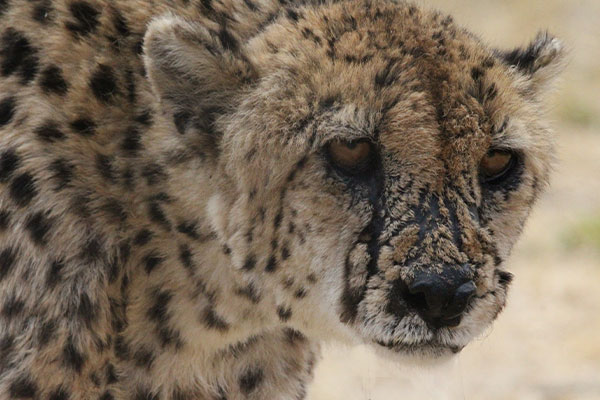
Al Pacino is a ten year old (as of 2021) male that was previously kept in captivity on a farm with three other cheetahs, one male named Al Pacino and two females, Old Lady and Marisa. In 2021 CCF was called to pick them up. The two males have a lot of scars on their faces (hence their nicknames) and we aren’t sure why. We separated the males from the females and now they are living in two very large enclosures.
Aurora

Aurora was brought to CCF as a cub (only several weeks old) in April 2013. A farmer found Aurora without any sign of her mother and kept her for 2 weeks before calling CCF.
When she arrived at CCF her claws had been cut, she was malnourished, and was extremely frightened. Since being at CCF she has been introduced to another female cub, Rainbow, who arrived at CCF around the same time. The two have become companions and now share an enclosure.
Bella
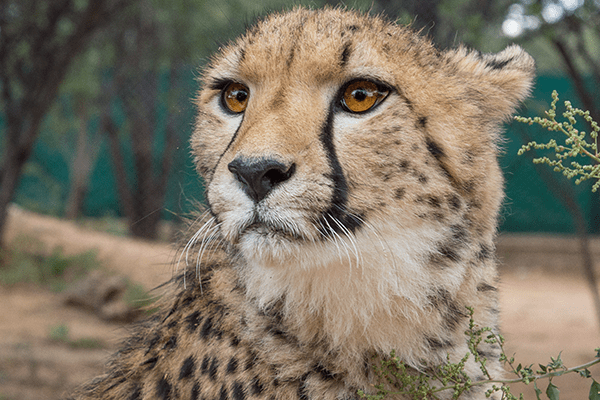
Bella came to CCF in December 2017 and is about a year and a half old. Bella was kept as a pet on a private farm with a male cheetah, Katiti. After not having permits granted to continue keeping them from the Namibian Ministry of Environment and Tourism, the pair were handed over to CCF. Before arriving at CCF, the pair had a poor diet of chicken necks. They have been transferred on to a diet of red meat with a vitamin and calcium supplement to help them grow and develop properly.
Bella is very habituated to people and will always purr whenever people are around her. She is confident in nature and is learning quickly during her training sessions at CCF. Both Bella and Katiti are inseparable, spending most of their days together exploring the new enclosures and meeting other cheetahs.
Dominic
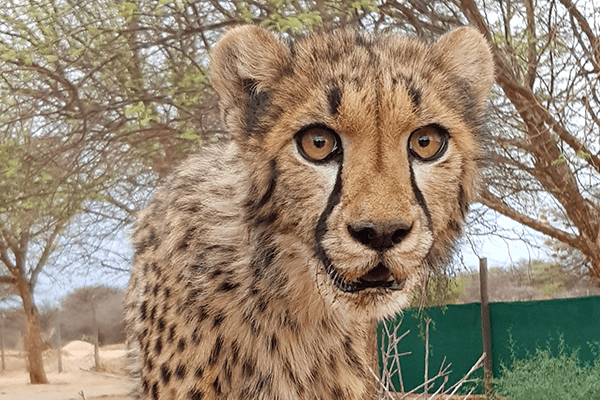
Dominic was orphaned in the Khomas region of Namibia. The Ministry of Environment and Tourism (MET) contacted CCF and staff drove out to meet a farmer reporting that someone had dropped off a cub at her farm. The farmer was looking after the cub for about a week but she became concerned when the cub started to have health problems. The farmer was was not able to provide the right level of care necessary for Dominic. It is unclear how he became separated from its mother.
CCF staff picked up the Dominic and took him to a local vet for an initial assessment before bringing it back to CCF. He was about 10-14 days old and his eyes had just opened. He didn’t have any teeth yet. CCF staff prepared and sterilized a nursery area for him and began a feeding schedule of cat milk supplement every three hours. The little cub was very responsive to care, and was very active with lots of chirping and purring at feeding time. He slept very well and got plenty of rest and lots of special care from CCF staff and is now doing well.
Hans
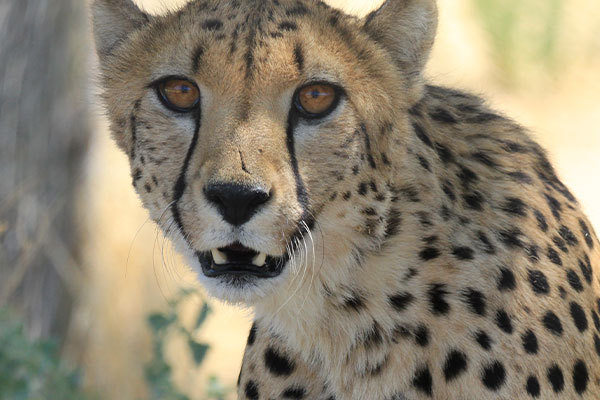
Hans arrived at CCF in 2020. He was caught in a capture cage and his family could not be found. Hans came from a farm in the Gobabis area. Staff from our CCF East base collected the cub from the farmer with the help from the Ministry of Environment, Forestry & Tourism (MEFT), staff. They met CCF’s cheetah team halfway for a transfer. Hans was not in good shape when we received after being in a capture cage for about a week or so before the farmer was in contact with CCF. He has healed and recuperated and is now close with resident cheetah Rocket.
Jaya
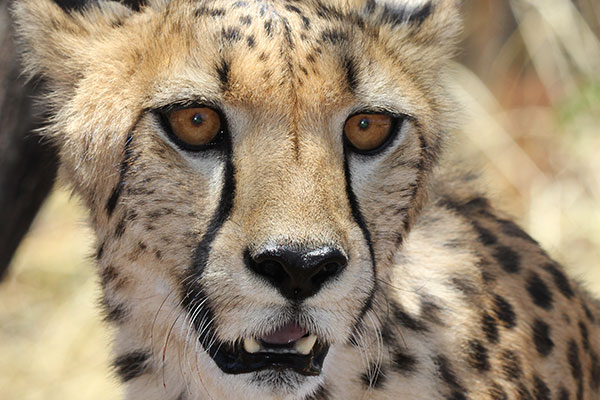
In September 2019, CCF’s staff drove 9 hours in a round trip to pick up Jaya. A nice Namibian farmer had picked her up along the road. She was a very sad and scared cub. She had been found next to her mother who had been killed by a car. Jaya was still trying to nurse from her mother when the farmer found her. The farmer took her home and put her in a clothes closet for a day to keep her safe and secure. She recovered at CCF and has thrived in friendship with fellow orphaned cubs, Rocket and Hans.
JEV
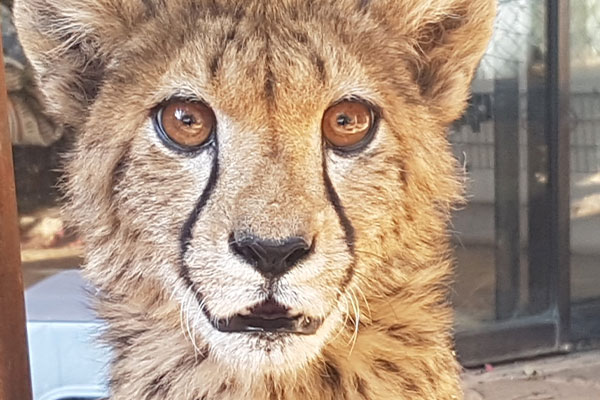
JEV came to CCF in November 2021. JEV lost his mom and siblings in a catch cage on a farm. JEV is named after French racecar driver Jean-Éric Vergne, known as JEV for short. The cheetah JEV loves food so keepers are using that as motivation in helping him to gain comfort in his examinations and any necessary human interactions. We are working to give him proper socialization with cheetahs that are young enough for him to be able to safely play and he is working toward making friends with them at CCF’s Centre in Namibia.
Katiti
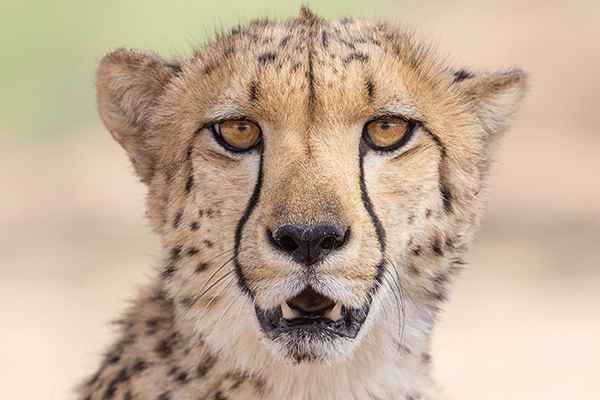
Katiti came to CCF in December 2017 and is about a year old. Katiti, however not tame, was kept on a private farm with a very tame female cheetah, Bella. He had been castrated a couple months earlier. After not having permits granted to continue keeping them from the Ministry of Enviroment and Tourism, the pair were handed over to CCF.
Before arriving at CCF, the pair had a poor diet of chicken necks so have been transferred on to a diet of red meat with a vitamin and calcium supplement to help them grow and develop properly. Katiti is quite a shy cheetah and is always keeping a close eye on what’s going on around him. He tends to follow Bella around everywhere she goes which is helping him gain confidence along with the close work of his keepers. Both Bella and Katiti are inseparable, spending most of their days together exploring the new enclosures and meeting other cheetahs.
Khaleesi
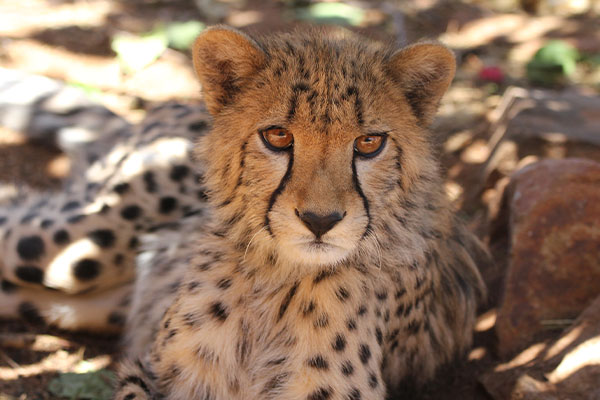
Khaleesi’s mother Daenerys was released in February of 2019 and we had been monitoring her, collecting her satellite collar data ever since. In February 2021, CCF and Erindi Private Game Reserve staff noticed that there was a problem with Daenerys’s data.
When we went to investigate, CCF staff discovered that Daenerys had a broken leg so we took her back to our Centre. Animal healthcare staff also noticed she was pregnant. Daenerys underwent several surgeries to heal her leg and While she was in recovery she gave birth to Khaleesi. Due to the nature of Daenerys’s injuries, she could not properly take care of her cub. CCF staff stepped in and now Khaleesi is growing up as a resident cheetah here at CCF’s Headquarters in Namibia.
Koya
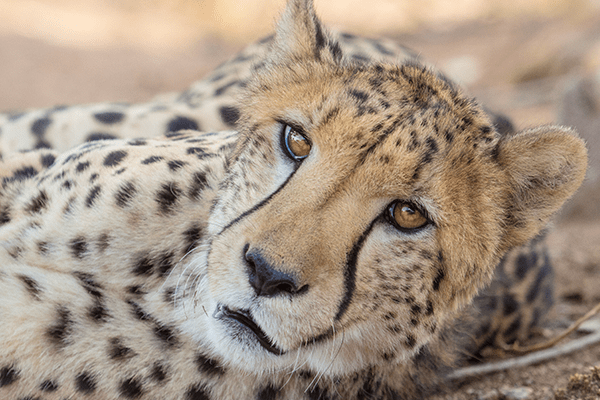
Koya came to CCF in July 2017 with his brother, Niko, they were about 6 months old. The two cubs had been at a small holding north of Otjiwarongo for over two months after being captured and sold to the people CCF received them from by the local butcher. The two cubs had been kept in a small chicken coop, fed a poor diet of offal and fatty meat with no calcium or vitamin supplementation and was suffuring from early stage metabolic bone disease. Koya had had no exercise, so was very overweight, When the brothers first arrived, they were very nervous and cautious of people.
Now, Koya is very confident and loves stalking birds. He always comes running over to greet his keepers and has learnt how to run on our lure course to stay fit and healthy. He spends most of his day with his brother Niko exploring their enclosure together and meeting other cheetahs here at the centre. Because the brothers will be resident cheetahs, they are going through some training with their keepers to make their life here as stress free as possible e.g. Crush cage training, injection/blood draw training, feeding at the centre with the other cheetahs.
Marisa
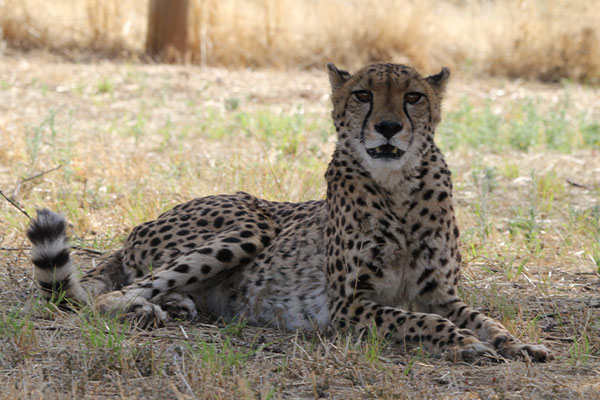
Marisa came from a farm where she was being kept in captivity with three other cheetahs. Two males, Al Pacino and Scarface. They were held at the farm for the past seven years and in 2021 CCF was called to pick them up. Marisa is a very independent cat and now living in Eland’s Pen with five other females. She is a bit of a loner and very feisty.
Peter
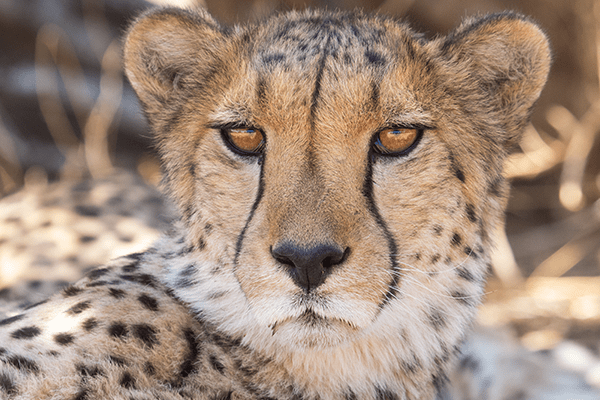
Peter was caught by a farmer in the Khomas Hochland area, east of Windhoek, when he was about one year old. CCF does not know what happened to the rest of his family as he was too young to be on his own at that stage. The farmer gave him to a lodge, and he was kept there as a companion for their tame cheetah. However, they never got along and after a year the farmer decided he did not want Peter anymore. CCF fetched Peter in June 2006.
Polly
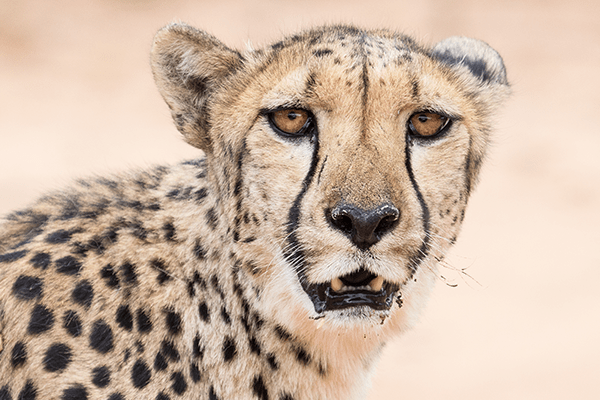
CCF had been following Polly’s mom via satellite radio collar for a year; and in July 2009 a farmer called to say the mother was found dead. CCF staff knew that she had cubs, so, working with the farmer, they set catch cages and caught Polly with her three siblings after about a week. They were ~3 months’ old. They now live at CCF. Polly is the only female of the four cubs, and is named after Polly Hix, a donor of CCF. She is playful and never misses an opportunity to pounce on and wrestle her brothers until they respond and play with her.
Rainbow
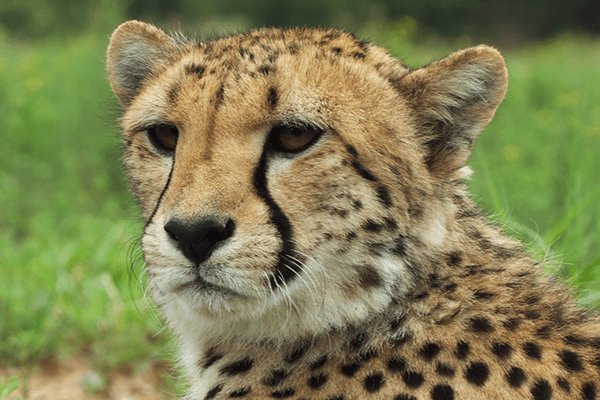
In February, 2013, a local farmer had found Rainbow by the side of the road and had brought her back to his farm. After a week of trying to nurture her back to health, he called CCF to pick her up. CCF found Rainbow in a small cage. She was frightened, and while the farmer had been able to give her a little food during the week, she was very thin. She was given the name Rainbow, in honor of the bright rainbows that had appeared in the sky during the more than three hour drive it took to retrieve her. Rainbow is one of a pair of cubs that have formed a coalition of sorts after both were rescued from different farms. She and her coalition mate, Aurora, are adjusting well to life at CCF and are quite popular with our visitors.
Rocket
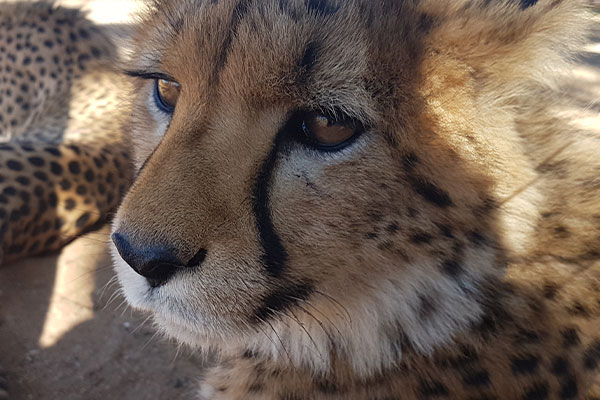
Rocket (HeChee) came to CCF at about 7 -8 weeks old in 2019. He was very small, tired and scared when he first arrived. The Ministry of Environment, Forestry and Tourism (MEFT) said that Rocket was caught by farmer after his dog was found chasing it. The farmer kept Rocket for a week and tried to get a permit to keep him but MEFT denied the request. Rocket was paired with Jaya who arrived shortly before he did. They became adoptive siblings and are very close now. The three can usually be found snuggling together in their enclosure.
Senay
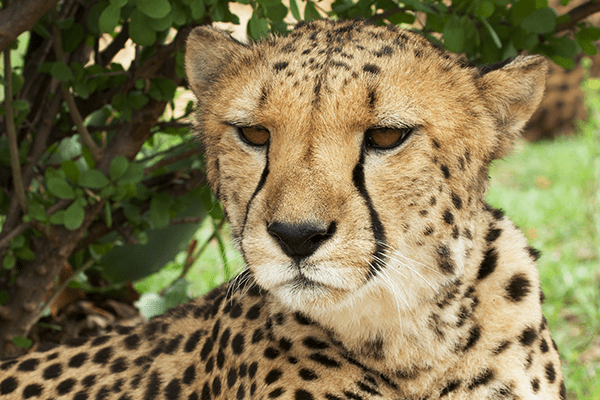
Senay is one of the four Okakarara Cubs, which were brought to CCF when they were only a few weeks old in 2010. Senay and her brothers Khayjay and Peter and her sister Tiger Lily live together at the CCF Center and are being specially trained to be Ambassador Cheetahs. They will meet visiting school groups, distinguished guests, farmers, and other people from all over Namibia, and will teach everyone they encounter about the cheetah and its race against extinction. Senay loves to keep company with her siblings and works very cooperatively with her handlers.
Tiger Lily
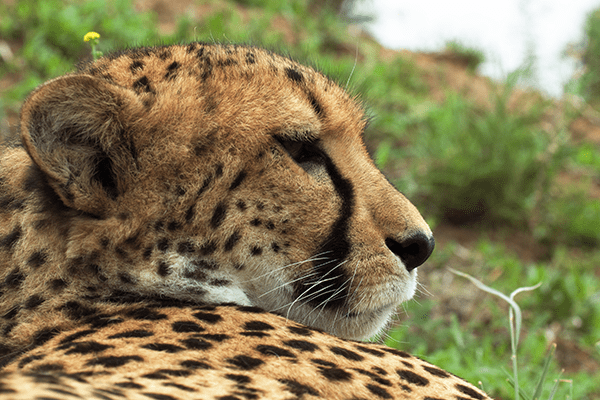
Tiger Lily is one of the four Okakarara Cubs, which were brought to CCF when they were only a few weeks old in 2010. Senay and her brothers Khayjay and Peter and her sister Senay live together at the CCF Center and are being specially trained to be Ambassador Cheetahs. They will meet visiting school groups, distinguished guests, farmers, and other people from all over Namibia, and will teach everyone they encounter about the cheetah and its race against extinction. Tiger Lily seems to love to chase the lure and keep company with her siblings. She works very cooperatively with her handlers.